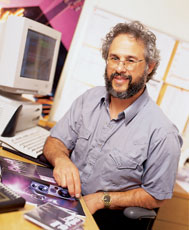By Steve Oppenheimer
(May 2003)
Most EM readers had the opportunity to attend elementary- or high-school music classes, where they could learn about traditional folk and patriotic music, and even get a taste of classical music. If you were lucky, your school might even have had a jazz band. My high-school class produced several professional musicians, but more important, many students learned to appreciate a variety of musical genres. If we preferred rock ‘n’ roll, it wasn’t because we lacked exposure to other genres, and those who wished to read music and get a handle on the fundamentals of performing were able to do so.
Unfortunately, times have changed. The ongoing economic mess, combined with the current emphasis on the “three Rs,” often results in slashed funding for school music programs. As a result, it’s increasingly difficult to maintain a good program in many districts. If this trend continues, the next generation is likely to have narrower and less-informed musical interests than previous generations, and many students who might have become performers will never develop that interest. Even if some budding musicians find mentors on their own, that doesn’t help the far larger number of kids who will never discover their talent or will never learn to enjoy listening to music that they wouldn’t have discovered on their own.
The problem is not with the teachers. Most music teachers work absurd hours and buy at least some of their materials using their own inadequate pay. Good tools exist, too: developments in music technology have produced software and hardware that could revolutionize music education at all levels and dramatically increase students’ excitement about music appreciation and music-making. Furthermore, new national standards for music education demand that teachers learn to apply at least some of these tools.
To use a tool, however, teachers must have access to it, and then they need sufficient time and training to learn to use it. Only then can they integrate the new tool into lesson plans. For teachers who aren’t technology whizzes, that prospect is scary, if promising.
The situation can be saved, but only if concerned parents and members of the music industry are willing to speak out. In my April 2002 editorial (“The Front Page: A Time for Us”), I wrote about the Technology Institute for Music Educators (TI:ME; www.ti-me.org), whose training programs are surely part of the solution. But even with TI:ME training and certification, what good does it do students if teachers know how to use a sequencer but don’t have computers, or if music departments are savaged by budget cuts and the teachers get laid off?
Of course, if you don’t care whether the next generation gets a chance to learn about music other than what they hear on commercial radio, then you need do nothing. But if you want music programs in the schools to prosper so that today’s children can learn a bit about Beethoven and Basie, let your local and state officials hear about it loud and clear – soon. Otherwise, be prepared for a generation that knows a lot about Brittany (Spears) but nothing about (Benjamin) Britten.
